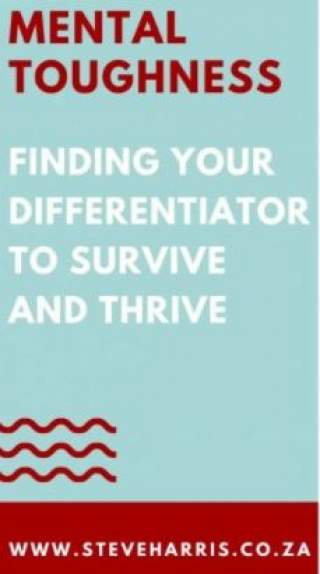Can Your Hyper-Anxiety Lead to Depression?
In his Mental Toughness series, Dr Steve Harris, motivational speaker in South Africa, recently discussed that the drivers for hyper-anxiety are usually the negative legacy emotions of shame and guilt. These self-defeating emotions are triggered opportunistically after you experience the consequences of trauma.
Tragically, hyper-anxiety is also associated with constant rumination about negative events in your past or about events that could happen in the future. This causes you to perpetuate depressive behaviours because you find new, imagined problems to be anxious about.
In this state your reasoning capacity is impeded, and you become governed by a melodramatic, as opposed to a fact-based world view. Thus, instead of rationally recognising and logically analysing your feelings of regret or remorse caused by the trauma that could catalyse a change in your behaviour, you end up searching for reasons to justify your feelings of guilt and shame. The result is blaming others or being angry with them as you try to navigate a constant sense of crisis.
People suffering from hyper anxiety tend to mix up what is a frightening or perceived threats, with a dangerous and real threat. This results in a conflict between the life they expected and the one they have and is mostly accompanied by a notion that they have less, if not – no choices. They often see bad over good and become prone to conspiracies while blaming others. They then struggle to accept responsibility. Their flight or fight response is on high alert which causes exhaustion and burn-out.
Substance Dependence Behaviour
In such circumstances, your brain depends on a pain managing or recreational substance that you see as a medicating, soothing or a stimulating solution – without considering that the substance may be problematic. The misuse of cell phones and social media dependency are also included in dependency behaviour.
The overuse of substances is particularly hazardous when combined with a predilection for addiction. You often become righteous, polarized, irrational, have mood swings, renewed anxiety, fear, distrust, and extreme bouts of anger. When challenged about irrationality, you revert to denial and counter accusations. Anti-social behaviours like lying and stealing manifest and personal hygiene deteriorates.
Extreme Grief can Contribute Towards Depressive Behaviour
During a state of severe sadness, you may experience anhedonia – a lack motivation, a feeling of being left behind, experience chronic remorse, loneliness, irrational hopelessness, and despair. You become a ‘baby doomer’ dominated by the belief that you have lost touch with happiness.
In my opinion, the concept of chasing happiness opens a can of worms. Firstly, we often confuse excitement and goal achievement with happiness. Secondly, the suffering and sacrifice endured in the quest for this goal achievement highlights the opposite, i.e., it magnifies what you are not achieving.
You need to allow room for reflecting on the role of lofty goals and consider cutting back on your expectations if they are at the root of your suffering. Ralph Waldo Emerson wrote, “the purpose of life is not chasing happiness. It is to be useful, honourable and compassionate”.
Should Happiness be our Default Position?
Please follow this link to continue reading this article.
Does Talent Equate to a Competitive Advantage?
Dr Steve Harris, The Mind Doctor and motivational speaker in South Africa, recalls being told that no matter how hard you practice and strive for excellence; you can never achieve the same levels of mental or physical prowess as talented leaders, elite athletes, and high achievers. His research shows that this claim is false.
Steve agrees that some people certainly have a greater inclination for sports or certain leadership positions. For example, you are unlikely to become an international Lock Forward in rugby unless you are tall, and preferably taller than two metres.
However, everyone can acquire skills that enable them to improve their performance and excel within the realms of their boundaries – you need to learn how to become the best version of yourself. When you start out on this journey, the first thing you need to realise is that it is both mental and physical attributes that allow you to get ahead of the pack. Essentially, you have to be mentally tough and resilient in today’s fast-paced and stress-induced world.
Mental Toughness Requires a Holistic Approach
The ideal approach to developing mental toughness is a holistic methodology. You cannot gain a sustainable competitive advantage by simply concentrating on one angle. The key is to set an objective and be mentally tough enough to follow through with it. There must be an alignment between what you say and what you do to accomplish and develop a competitive advantage.
Nature and Nurture
Some people are born with or develop substantial physical or technical abilities that help them become successful. These abilities are enhanced when supported by mental toughness. Talent, combined with mental toughness is a powerful combination. Mental toughness is a resource that can and must be developed.
With increased mental toughness, those with a small amount of talent can become the best version of themselves and prevail over those with some talent, but no mental strength. However, mental toughness is not a solution on its own.
How Much Success can be Attributed to Mental Toughness?
Professor Ross Tucker talked about the relative mental and physical contributions needed to succeed. He concluded that there is no exact figure on how much each grants you. He said, “Some say it is 50% mental and 50% physical to 100% mental and 100% physical, but it depends on the context.”
In the above example, he was referring to sport. “Canoeing is different from athletics; long jump differs from high jump, both of which vary from a marathon. Downhill skiing, no doubt, requires substantial parts of both mental and physical application……, it’s difficult to pin down.” (Tucker, 2013).
Improve Your Inner Game
Playing the outer game of golf requires knowledge of the sport and its mechanical skills. To improve the outer game, you need to increase your game expertise and develop mechanical skills through learning and experience. However, your inner game exists beyond the knowledge and logistics of the game. Understanding and developing this intrinsic resource has a huge influence on your performance. Great golfers understand that the outer game can only take them so far; to get further, they need to improve their inner game because this understanding will ultimately enable them to improve performance over time.
In a last word about talent, Marianne Adams gave a TED talk, where the gist of her conversation was “Talent doesn’t mean anything if you are a jerk.” This requires no further explanation!
Dr Steve Harris has been studying performance for thirty years, of which fifteen have been devoted to performance improvement through an integrated mind and body approach. His MBA dissertation at the University of Cape Town focused on business performance improvement. He followed this with a PhD thesis on Mental Toughness as a factor in performance.
Academic research combined with experiences assisting business organizations and sport teams at all levels led to his work as a motivational speaker, workshop facilitator, conference speaker and keynote speaker. Steve is now also offering leadership courses. Steve has the business knowledge and skills to view a wide range of problems with a perspective broader than the established patterns that entrench thinking and close minds.
To hire Steve as a motivational speaker, facilitator or for successful team building programmes, This email address is being protected from spambots. You need JavaScript enabled to view it..
Surviving To Thriving - A Blue Oceans Strategy
I am using Chan Kim’s book, Blue Ocean Strategy (2005), as the framework for a surviving to thriving guide. Kim’s blue oceans’ metaphor defines a blue ocean as a less contested market space. In this space, the opposition is not as relevant, and you thrive (Kim, 2005). I believe one can apply blue ocean strategies at an individual level as well as a business one.
Kim explains that we primarily operate in highly contested Red Oceans, whereas in Blue Oceans, there is less competitor activity. He uses four quadrants to categorise what action to take to exit Red Oceans and enter Blue Oceans. I will give some of my examples of each.
The first category to get out of red oceans – eliminate
What must you eliminate to get out of red oceans? I suggest starting with energy leaks from poor wellness. Then eliminate poor customer experiences. Finally, try treating customers like VIP’s – which means treat them as they would like to be treated as opposed to the old mantra – treat them like you would like to be treated. This requires you to eliminate bureaucracy by reducing red tape and providing more red carpet.
The second category to get out of red oceans – reduce
I firstly suggest reducing judging, complaining, blaming, and gossiping. For the second point, I want to draw on the potential hazards of social media acting as an energy leak. I gleaned this from the movie “The Social Dilemma”. If we become aware of this concern associated with social media, we can save a lot of energy floundering around in red oceans and spend more accessing blue oceans. In the movie, Tristian Harris explains how our energy could get drained by the attention model used by social media sites. They use these to keep us on their site and in so doing improve their advertising revues.
Note, there is nothing intrinsically sinister with their approach; the problem lies in our lack of awareness of their ever refining, personalised algorithm to keep us mesmerised and spend more time on their social media site.
The next point to become aware of is that social media inevitably blurs facts because it has little if no editorial integrity nor sanction like an official newspaper or news channel has – of course, I acknowledge there is bias in everything we are presented in all domains, including official news outlets. They are, however, subject to rules. Therefore, know that when you are on social media sites, an algorithm is monitoring what you are interested in to feed to you reports or videos that follow a similar theme. So most things you view on, say, YouTube are suggested by the algorithm and not something you looked for in the first instance.
Once you are caught up in the flow of the algorithm – or dare I say caught up by our addictive nature, you probably experience increased anxiety, hostility, and nostalgia. You may even lose trust in science, as you reinforce your confirmation bias with “evidence” from half-truths fed to you by an algorithm that has got to know more about you than your closest friends and family know.
After a while, it is equally likely you feel enlightened and encouraged by this evidence whilst you will start considering others “sheeples” who are under the influence of an enemy like a world government, Bill Gates or any others uncovered by your social media journey.
Finally and hopefully, you become aware that it is you who may have been mind-captured and are increasingly suspending your critical thinking whilst wandering into a polarised cognitive bubble of intolerance – even willing to alienate friends, as the boundaries of your issues harden.
The third category to get to blue oceans – raise
What must you raise to enter blue oceans? My first suggestion is to improve teamwork, partnerships, and communication. Secondly, express more thankfulness, inspiration, empathy, and mental toughness. Finally, develop new knowledge and skills, e.g. including multiple perspectives and critical thinking. Innovating and improvising to do more things faster and better; becoming techno-savvy and managing the mess – not limited to your own.
The fourth category to get to blue oceans – create
To enter blue oceans, I suggest you create a strategy for surviving to thrive, e.g. one that aligns with national priorities, research, stakeholders’ problems and brings your values to life. In addition, it bonds staff into an organisational culture through its shared mission and values. It embraces multiple bottom lines, helps you flow around VUCA (Volatility, Uncertainty, Complexity and Ambiguity) and adapt faster than the opposition to a changing context. In this way, we adjust to the reality of ever-increasing instability.
It has a plan B to give you global sustainability and risk plans that cater to black swan shock events. In addition, you identify how to create stakeholder commitment to the strategic plan, accountability for results and ethical behaviour. Finally, it maintains current value (what we should do) plus imagines, then researches new ideas from which you invent new values (what we could do) with differentiators that yield unique competitive advantages.
This email address is being protected from spambots. You need JavaScript enabled to view it. and let us know if you have been mind-captured by social media feeds.
Motivational Speaker, Dr Steve Harris, has been studying performance for thirty years of which fifteen have been devoted to performance improvement through an integrated mind and body approach. Steve has the business knowledge and skills to view a wide range of problems with a perspective broader than the established patterns that entrench thinking and close minds.
Mental Toughness - Finding Your Differentiator To Survive And Thrive
Dr Steve Harris’ (The Mind Doctor) research and personal experiences have led him to believe that the evolution from surviving to thriving is achieved through incremental, smart, and primarily proactive adaptations that provide humans with marginal yet significant gains.
He asks you now to consider whether you are adapting so that you can progress from surviving to thriving? If you feel that you are already thriving, his question then is, “What are you doing to accelerate even further ahead?”
As a World Champion Sportsperson, Award-Winning Entrepreneur, Motivational Speaker, and armed with his PhD on Mental Toughness, Dr Steve Harris acknowledges that people struggling with harsh conditions, or persons with mental health concerns that draw them outside consensus reality, will struggle to adopt his ideas on thriving.
Steve says that to thrive, you need differentiators that make you stand out from the rest of the crowd. These differentiators must be something different and unique that set you apart from others pursuing similar outcomes so that you will have a distinct competitive advantage.
This type of advantage is usually admired by others unless you are signalling superiority, and in so doing, you are “othering”. Othering means that you are trying to establish that others are inferior to you.
For some, a stand-out competitive advantage may be highly stressful and therefore undesirable. This phenomenon is called FOSO – the Fear Of Standing Out. For them to benefit from standing out, they need to develop specific skills to manage the stress and possible resentment that could accompany this sometimes-lonely place. As is commonly said, “The tallest trees catch the most wind.”
The human polar bear, Lewis Pugh, created a unique competitive advantage. Lewis stood out for the right reasons when he created a unique competitive advantage. He achieved success through enduring extreme cold-water conditions and continued by achieving significance when he combined this ability with a passion for environmental sustainability.
Steve met Lewis when, as a junior, he joined the Clifton Surf Lifesaving Club in Cape Town. He was highly driven and hungry for personal accomplishment. Lewis trained hard and showed extraordinary willingness to go the extra mile. However, no amount of training would be enough to make Lewis a serious contender for top honours in the swimming aspects of competitive surf lifesaving. Top competitors were usually of Olympic standard. This did not deter Lewis, who continued to train more than most and helped to teach others.
An offshoot of his preparedness to train hard was his acceptance of the icy Atlantic sea temperatures off Clifton beach. His peer group lauded and respected him for this trait. Steve suspects that this acknowledgement and recognition motivated Lewis to use his adaptiveness to icy water as a differentiator. Eventually, it led him to international fame as an environmentalist and earned him the nickname ‘human polar bear’.
We all know how challenging life has been with the Covid pandemic – both for individuals and businesses. Finding your differentiator is not an easy task, but it will give you or your business a competitive advantage that may just help you survive these times.
Steve’s motivational speaking offering is unique in that he has various motivational topics to choose from to suit your company and help you achieve your objectives. These topics are tailor-made and suited to match your requirements, use a holistic approach and produce remarkable results!
Contact Steve to schedule some time with him.





